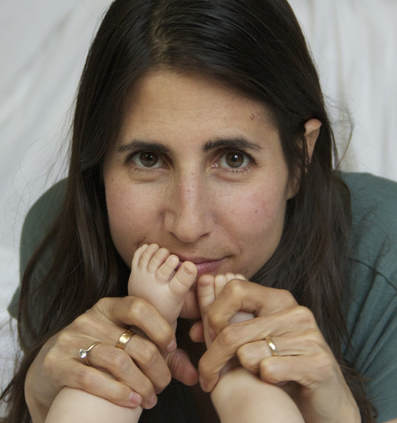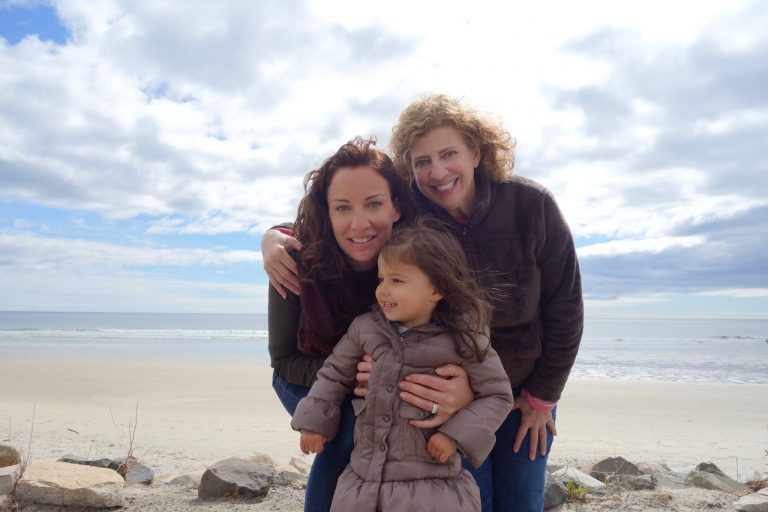|
written by Jen #supermom
Vered Benhorin is a music therapist, musician, psychotherapist and mom, whose album for parents and babies “Good Morning My Love” won the Parents Choice Gold Award, the National Parenting Publications Gold Award and Baby Album of the Year Award by Creative Child Magazine. Vered teaches parents how to form closer bonds with their babies through music, including certain soothing techniques and establishing a routine through song. We are super excited to announce that South Slope Pediatrics will be holding a free class with Vered on March 2nd for babies 0-3 months (keep a look out for the invitation via email)! SSP: Can you please tell us a little about yourself, and how you became involved in music therapy? Well, a long time ago I started out with plans to be a rock star 🙂 or at least a singer/songwriter who is able to live off the music. I recorded a few albums and performed with a band. But alongside my nighttime music career I also always worked with kids helping them write original songs. The more I did it I was struck by the therapeutic affect it had on the kids. They sang and wrote about issues that were hard for them and the music helped them release some of those emotions. After realizing I had been doing music therapy for a while I decided to go back to school and gather more knowledge and techniques. SSP: How does someone “tune in” to his or her baby, and how does a baby understand and respond to the music? Tuning in to your baby has to do with noticing their cues and their rhythms. Parents intuitively do this all the time without noticing. They react to a raised eyebrow showing aversion, or a smile showing liking, or subtleties in their babies’ whining. Tuning in also has to do with being emotionally present and reading the baby’s emotions. Again, parents often do this – when they soothe a crying baby, when they sing to a smiling baby. It has to do with trying to understand where the baby is coming from. In psychology it is called mentalization – interpreting behavior in terms of underlying emotions, desires, beliefs. This sounds simple but when we have a lot going on in our own emotional world this can be increasingly challenging. And parents always have a lot going on. Babies respond to music in vitro and beyond. There have been numerous studies showing that babies listen to and remember music from early on. After birth babies can sometimes hear differences in rhythms and melodies from different cultures that adults cannot because adults have desensitized to music from cultures other than their own. For all of us, grown ups and babies, music releases endorphins that relax the body and make us feel soothed and happier. SSP: What do you see as the most important benefits of using song and music in daily interaction with our babies? There are so many. First of all, it helps us establish that ever-illusive routine. For instance, if a parent sings the same lullaby every night during the bedtime routine, by the time the baby is 7 or 8 months she will be rubbing her eyes at the sound of it. It also soothes the baby through that transition by relaxing his body and preparing him for sleep. Music also is a great way to engage with the baby fully. Listening to music and singing can bring up emotions. It is a direct route to our feelings that bypasses intellect. When we sing to and listen to music with our babies we are that much more present emotionally and are able to tune in to our babies. Our baby feels that and it is a feedback loop – our baby enjoys that time and smiles at us, we continue to sing and smile back, etc. It is not easy to be present with our babies all the time. We have a lot going on and often multitask. Music helps us organize our day and feel more connected with our babies. And that feels more gratifying for both the parent and the baby. Music can also help the baby develop language as the baby becomes acquainted with different rhythm patterns that will show up in speech. Repetitive melodies also help our babies remember sounds and experiment with them. This aids them in learning their first words and developing a vocabulary. SSP: What kind of benefits do you see for the parents? Any parent who has more than one kid knows how fast this time passes. If we can create moments of deep connection we feel more gratified. But the benefits of the music are the same for the parent – it soothes them, makes them happier and helps to release emotions. SSP: We often think about attending these kinds of classes for our first born, but isn’t it equally important to consider for a 2nd (or 3rd, etc)? Actually often it is the second or third time moms who appreciate my classes the most. For them it is so valuable to have an hour a week where they are focusing on their baby fully. Those parents might have a whole repertoire of music that they do with their older child but they don’t have time to start to build a new one with their younger. The class reminds them to take a moment, slow down, connect, sing a song together, and become acquainted with the rhythm of the new baby. SSP: What ages do you focus on, and why? My classes focus on 0-24 months. The reason is that my class is more for the caregiver than for the baby. They are about providing tools for the caregiver that they will use with their baby at home. Hopefully it is also a place where the caregiver will feel supported emotionally through discussion and song. Classes that are built for older toddlers can feel loud and overwhelming, for the baby and the parent. SSP: Where do you hold your music therapy classes, and how does one take part in this? Normally they are held at someone’s home. A parent will contact me and ask to host and organize a group. The host gets the group for free. Usually all it takes is putting the word out on their Park Slope Parents or other neighborhood email group. My current groups are on my website at www.babyintune.com/workshop. They are open to anyone who would like to join. SSP: Where can someone listen to and purchase your CD “Good Morning My Love”? Both of my CDs can be listened to and purchased on my website at www.babyintune.com. SSP: Is there anything else you’d like our readers to know about what you do and the importance of music in our lives? I wonder if people might read this and feel uncomfortable – they may not like to sing, or feel insecure about their voice or musicality, they may feel like they haven’t found music with their baby that feels right. If so they are like everyone else. We ALL have insecurities when it comes to singing. It can feel very vulnerable and emotional. We talk about that a lot in my groups. My goal is to help parents feel more confident through learning how to use your breath, learning what tones to use, and just feeling comfortable with being goofy and not necessarily sounding “good”. Posted on February 17th, 2016 Posted by Jen Valu
0 Comments
Leave a Reply. |
Jen Valu
|



 RSS Feed
RSS Feed




